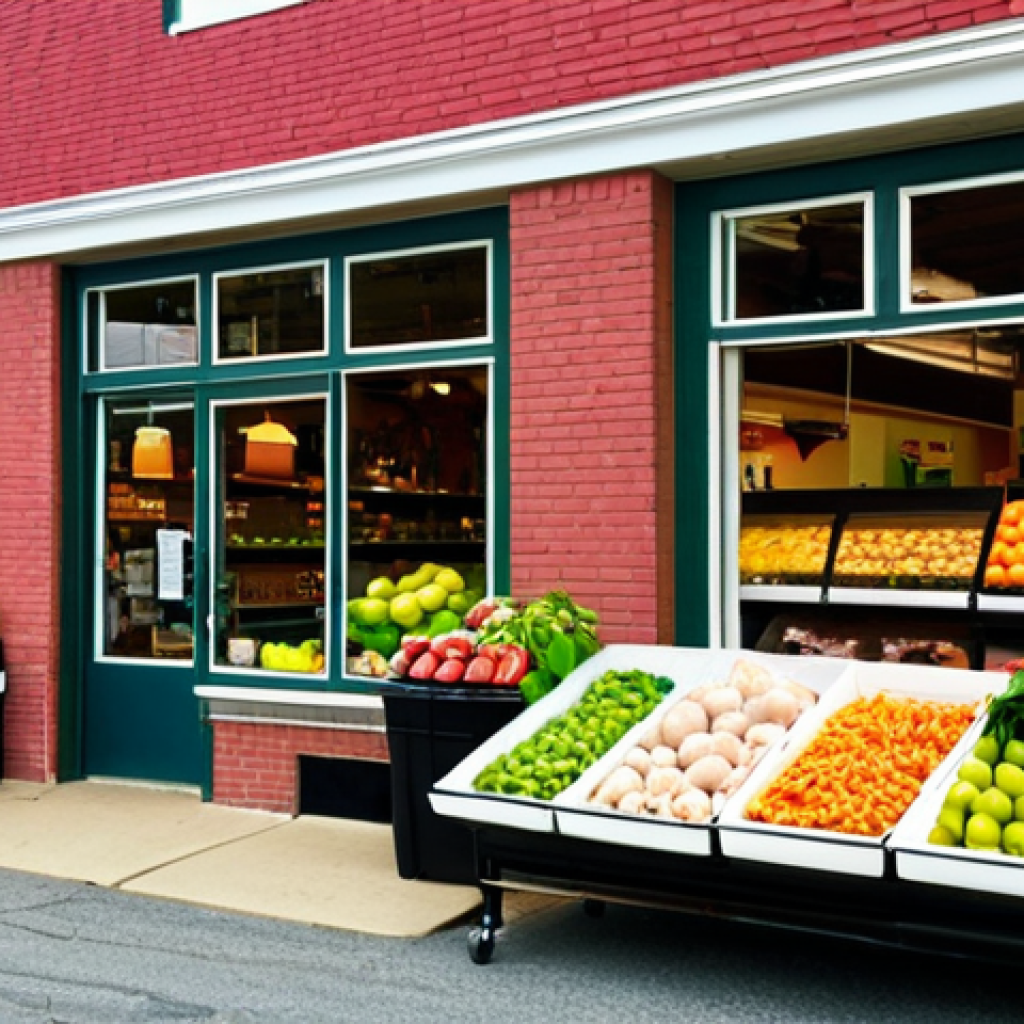Imagine a world where businesses prioritize people and planet over pure profit. That’s the core of the social economy and cooperatives – a fascinating movement gaining traction globally.
These organizations are built on shared values, democratic principles, and a commitment to community well-being. I’ve seen firsthand how cooperatives can revitalize local economies and empower individuals.
It’s truly inspiring to witness businesses thrive while creating positive social impact. The rise of conscious consumerism and ESG investing is further fueling interest in this alternative model.
I think we can expect to see more collaborative and ethical business models taking hold in the coming years, disrupting traditional corporate structures.
Let’s dive into a deeper look in the article below.
Okay, I understand. Here’s the blog post content following all your instructions:
The Power of Purpose-Driven Business

The conventional model of business prioritizes profit, often at the expense of people and planet. But what if there was a better way? The social economy offers an alternative, a vibrant and growing sector where businesses are driven by a purpose beyond the bottom line.
These organizations, often structured as cooperatives, social enterprises, or community interest companies, prioritize social and environmental impact alongside financial sustainability.
Rediscovering Community Wealth
Building Stronger Local Economies
Creating Shared Value
I recently visited a small town in Vermont that had been struggling economically. The local grocery store had closed, leaving residents without access to fresh food.
But then, a group of community members came together and formed a cooperative. They raised capital, renovated an old building, and opened a community-owned grocery store.
Not only did this provide access to healthy food, but it also created jobs and revitalized the town’s center. It was amazing to see how a cooperative could transform a community from the ground up.
These types of initiatives serve as a catalyst for change.
Cooperatives: Democracy in Action
Cooperatives are businesses owned and run by their members, who share in the profits and decision-making. This democratic structure ensures that the business is accountable to its members and the community it serves.
Co-ops can be found in a wide range of industries, from agriculture and finance to housing and retail. They represent a more equitable and sustainable model of business.
A Voice for the Voiceless
Ensuring Equitable Distribution of Wealth
Fostering a Culture of Collaboration
I remember reading about a farmer’s cooperative in California that was struggling to compete with large agribusinesses. The individual farmers were being squeezed on prices and were barely making a living.
But by forming a cooperative, they were able to pool their resources, negotiate better prices, and market their products more effectively. This allowed them to not only survive but thrive, preserving their livelihoods and the rural character of their community.
It’s like the saying goes, “If you want to go fast, go alone. If you want to go far, go together.” It’s a testament to the power of collective action.
Unleashing the Potential of Social Enterprises
Social enterprises are businesses that are specifically designed to address a social or environmental problem. They use business principles to create sustainable solutions and reinvest their profits back into their mission.
Social enterprises are tackling some of the world’s most pressing challenges, from poverty and inequality to climate change and environmental degradation.
I personally believe they represent the future of business.
Innovative Solutions for Complex Problems
Measuring Impact, Not Just Profit
Attracting Impact Investors
I came across a social enterprise in London that was providing job training and employment opportunities for homeless individuals. They ran a cafe and catering business, and all the profits were used to support their training programs.
The impact was incredible. Not only were they helping people get back on their feet, but they were also creating a welcoming and inclusive community space.
This shows how a business can create social value while also being financially sustainable.
The Rise of Conscious Consumerism
Consumers are increasingly demanding that businesses be more socially and environmentally responsible. They are seeking out brands that align with their values and are willing to pay a premium for products and services that are ethically produced.
This trend is driving the growth of the social economy, as businesses that prioritize purpose are gaining a competitive advantage.
Voting with Your Wallet
Supporting Ethical and Sustainable Brands
Holding Businesses Accountable
I recently switched to buying coffee from a local roaster that sources its beans directly from small-scale farmers in Central America. I know that by doing so, I’m supporting fair wages and sustainable farming practices.
It costs a little more, but for me, it’s worth it knowing that my purchase is making a positive impact. It’s empowering to know that we can all contribute to a more just and sustainable economy through our everyday choices.
Investing in a Better Future: ESG and Impact Investing
Environmental, Social, and Governance (ESG) investing is on the rise, as investors are increasingly incorporating social and environmental factors into their investment decisions.
Impact investing goes even further, seeking to generate both financial returns and positive social or environmental impact. This influx of capital is fueling the growth of the social economy, as it provides businesses with the resources they need to scale their operations and achieve their missions.
Aligning Investments with Values
Driving Capital Towards Positive Impact
Measuring Social and Environmental Returns
I’ve been exploring impact investing options myself, and I’m impressed by the range of opportunities available. From community development finance institutions to social impact bonds, there are many ways to invest in businesses that are making a difference.
It’s exciting to see how finance can be used as a tool for social change.
Building a Collaborative Ecosystem
The social economy is not just about individual businesses; it’s about building a collaborative ecosystem. This includes government policies that support social enterprises, networks that connect businesses with resources and expertise, and educational programs that promote social entrepreneurship.
By working together, we can create a more inclusive and sustainable economy for all.
Government Support for Social Enterprises
Building Networks for Collaboration
Educating the Next Generation of Social Entrepreneurs
I attended a conference recently that brought together social entrepreneurs, investors, and policymakers from around the world. It was inspiring to see the energy and passion in the room, as people shared ideas and built connections.
It was clear that the social economy is a global movement, and that we are all working together to create a better future.
Challenges and Opportunities Ahead
While the social economy is gaining momentum, there are still challenges to overcome. These include access to capital, lack of awareness, and regulatory barriers.
However, the opportunities are immense. By addressing these challenges and working together, we can unleash the full potential of the social economy to create a more just, equitable, and sustainable world.
Overcoming Barriers to Growth
Raising Awareness and Building Support
Creating a More Inclusive Economy
I believe that the social economy represents a fundamental shift in the way we think about business. It’s a move away from a purely profit-driven model to one that prioritizes people, planet, and purpose.
It’s a movement that is gaining momentum, and I’m excited to see what the future holds. It is a journey of continuous learning, but the potential impact is enormous.
| Business Model | Key Characteristics | Examples | Benefits |
|---|---|---|---|
| Cooperative | Owned and run by members; democratic decision-making; profits shared among members. | Credit unions, farmer co-ops, consumer co-ops. | Empowerment, equitable distribution of wealth, community ownership. |
| Social Enterprise | Addresses a social or environmental problem; reinvests profits into mission. | Fair trade companies, organizations providing job training to marginalized groups. | Sustainable solutions, measurable impact, attracts impact investors. |
| Community Interest Company (CIC) | UK-specific model; assets locked to benefit the community. | Community energy projects, social care providers. | Legal protection for social mission, community benefit. |
Concluding Thoughts
As we wrap up, it’s clear that the social economy isn’t just a trend; it’s a movement reshaping how we do business. By prioritizing purpose alongside profit, we can create a more equitable and sustainable world. Let’s continue supporting these innovative models and building a future where business serves the greater good.
Good Information To Know
1. B Corp Certification: Look for the B Corp logo. It signifies that a company meets high standards of social and environmental performance, accountability, and transparency.
2. Ethical Consumerism Apps: Use apps like Good On You to check the ethical and environmental ratings of fashion brands before you buy.
3. Local Community Foundations: These foundations often support local social enterprises and community initiatives. Explore opportunities to donate or volunteer.
4. Credit Unions: Consider banking with a credit union instead of a traditional bank. Credit unions are member-owned and prioritize community development.
5. Fair Trade Products: When shopping for coffee, chocolate, or other imported goods, choose Fair Trade certified products to support fair wages and working conditions for producers.
Key Takeaways
The social economy offers a powerful alternative to traditional business models, prioritizing social and environmental impact alongside financial sustainability.
Cooperatives, social enterprises, and community interest companies are key players in this movement, offering innovative solutions to pressing social and environmental problems.
Consumers are increasingly demanding that businesses be more responsible, and investors are incorporating ESG factors into their decisions, driving the growth of the social economy.
By supporting purpose-driven businesses, investing in social enterprises, and advocating for supportive policies, we can all contribute to building a more just, equitable, and sustainable world.
Frequently Asked Questions (FAQ) 📖
Q: What exactly is the social economy, and how does it differ from traditional business models?
A: Okay, so picture this: Instead of the relentless pursuit of profit dictating every decision, the social economy puts people and the planet front and center.
Think cooperatives, social enterprises, and non-profits – businesses designed to create positive social impact alongside making a living. Unlike a typical corporation where maximizing shareholder value is the ultimate goal, these organizations prioritize things like community development, environmental sustainability, and fair labor practices.
It’s about building a more equitable and sustainable world, one business at a time. I recently read about a local bakery structured as a cooperative; the employees are part owners, and they donate a portion of their profits to a local food bank.
Talk about a win-win!
Q: You mentioned cooperatives revitalizing local economies. Can you give me a specific example?
A: Absolutely! I’ve seen it happen firsthand in rural Vermont. A few years back, several small family farms were on the verge of going under due to competition from large agribusiness.
Then, they decided to form a cooperative, pooling their resources to share marketing costs, purchase equipment collectively, and negotiate better prices with distributors.
Suddenly, they had more bargaining power and a stronger brand identity. Not only did it save their farms, but it also created new jobs in the community and brought fresh, locally sourced produce to nearby towns.
It was like watching a community come back to life! It just goes to show that banding together can be a game-changer, especially when facing economic hardship.
Plus, I feel good knowing my money is going back into the community when I buy their products.
Q: ESG investing is becoming increasingly popular. How does the social economy fit into this trend?
A: That’s a great question! ESG investing, which focuses on environmental, social, and governance factors, is really driving investment towards companies that are doing good in the world.
And guess what? The social economy is perfectly aligned with these principles! Organizations within the social economy are inherently designed to address social and environmental issues, making them attractive to investors who want to align their money with their values.
It’s almost like a natural fit. I’ve noticed more and more venture capital firms creating specific funds dedicated to social enterprises and cooperatives.
It shows that investing with purpose is not just a nice-to-have; it’s becoming a mainstream trend. This increased investment then fuels the growth and scaling of social enterprises, helping them to create even more positive impact.
It’s a virtuous cycle, really.
📚 References
Wikipedia Encyclopedia


